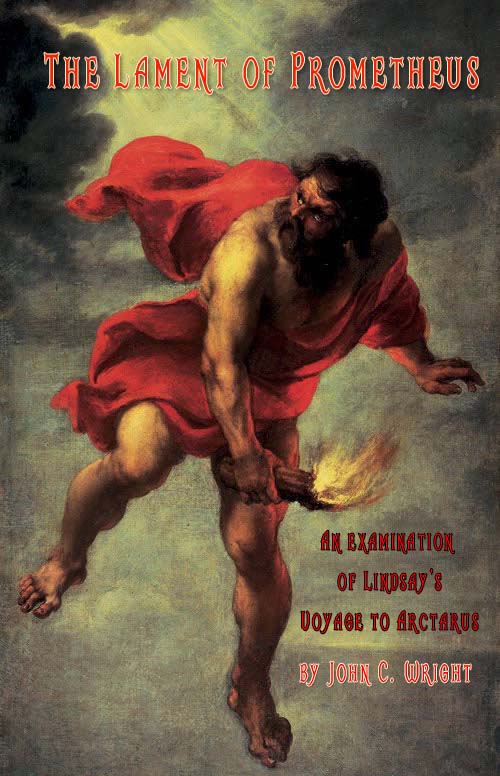The Lament of Prometheus
The Lament of Prometheus: An Examination of David Lindsay’s A Voyage to Arcturus
Finally, available on Amazon is a work of literary criticism I have been waiting for 13 years to publish. Now it is here.
See The Lament of Prometheus on Amazon
Here is the description of the book:
Lament of Prometheus in a nonfiction work in which award-winning science fiction Grandmaster John C. Wright in sets out to explain the inexplicable: A Voyage to Arcturus written in 1920 by Scottish author David Lindsay, is a fascinating, blasphemous, and magnificent failure.
Wright sets out to explore the weird, wild, wonderful world depicted in Lindsay’s forgotten masterpiece, to plumb its depths, decode its symbols, discover its secrets, and identify its breathtaking literary disappointment.
No other author else has dared such simply striking, mind-stretching, awe-inspiring, sublime absurdities as David Lindsay. From the description of new sense impressions to the depiction of unimaginable new primary colors, to the invention of a third positive sex unknown on earth, Lindsay challenges the reader to imagine the unimaginable.
Literary luminaries such as Gary Wolfe and Colin Wilson were fascinated by this blasphemous book, as was Michael Moorcock. In his sole attempt at fiction writing, the world-famous critic Harold Bloom attempted a sequel.
C.S. Lewis list it as his inspiration to write science fiction:
“From Lindsay I first learned what other planets in fiction are really good for: for spiritual adventures. Only they can satisfy the craving which sends our imaginations off the earth.”
It is the tale of a Englishman named Maskull, an everyman figure, transported via the occult means of backward light-rays to the giant planet Tormance circling the double star Arcturus, seeking a godlike but hidden figure named Surtur, who may be the devil, or the divine fire hidden in every man.
John C Wright makes an attempt as bold as Maskull to follow in his unearthly footfalls, to examine sheer weirdness of the conceit; the symbolism and philosophy; and to name rightly what David Lindsay hid under onion layers of riddles: a striking yet morbid message.
See The Lament of Prometheus on Amazon
A Personal Note:
Long have I awaited this day. Originally this analysis was written only for my own edification, to clarify and focus my own meditations on this odd and mesmeric work.
The tell grew in the telling, as they say, and when the column grew to book length, I decided it was worthy of being sold, despite the obscurity of the subject matter.

